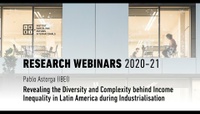Revealing the Diversity and Complexity behind Income Inequality in Latin America during Industrialisation
Pablo Astorga (IBEI)
Discussant: Martijn Vlaskamp (IBEI)
Available in video:
The period between 1920 and 1980 is of great importance for the study of inequality in Latin America because of the occurrence of state-led protected industrialisation amid structural, demographic and institutional transformations. Although there are valuable contributions at the country level, the study of inequality from a regional perspective has been hindered by limitations of comparable metrics. To address this gap a new dataset has been assembled including Argentina, Brazil, Chile, Colombia, Mexico and Venezuela (to be publicly available in the coming months). The approach adopted distinguishes four occupational groups: the top group includes property owners, employers and professionals; the remaining three groups are defined according to the workers’ skill level, largely receiving wage income. This allows for the calculation of inequality between and within groups, as well as overall Ginis for all income and wage income. The frequency of the series is annual, making it possible to track closely inequality trajectories. Despite being a high-inequality region, this new evidence reveals great diversity of outcomes across the six countries and complexity within the occupational structure. It also makes it possible to examine the contribution of key drivers such as the terms of trade and internal migration.
Pablo Astorga is an economist with considerable academic and market-oriented experience in the analysis of developing countries. He was a senior economist for Oxford Economics from 2001 to 2009, having under his responsibility the assessment and forecast of the Latin American economies and the management of various consultancy projects. Prior to that he was a research fellow at St Antony's College, Oxford. His research has focused on the study of economic development in Latin America over the long run, including income inequality, economic growth and productivity. The outcome of this research has been published in Journal of Development Economics and The Economic History Review among others.

